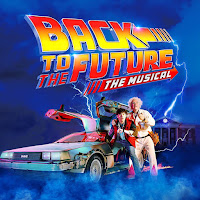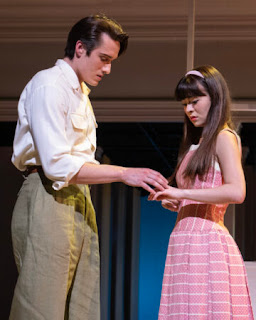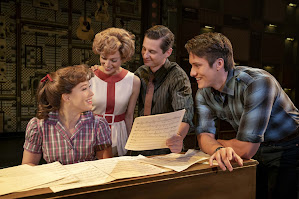ReDISCoveries: Myths and Hymns
(1999 Off-Broadway Recording)
Jeff has kindly invited me to revisit and review some of the older cast recordings in my collection. Every other week or so, I’ll write about a new CD, offering some general impressions followed by my thoughts about each individual song. I continue this week with the 1999 off-Broadway cast recording of Adam Guettel’s Myths and Hymns.
This recording of Adam Guettel’s modern song cycle is perhaps the least familiar one on my CD shelf. I’ve never seen a performance of the work (rather few have had that opportunity!), and before this week I had only given the CD one casual listening since buying a used copy about ten years ago. It’s interesting to approach a score like this with an almost total veil of ignorance about its music and lyrics. This approach is greatly facilitated by the non-narrative nature of the work, since one can appreciate each individual song without trying to figure out a story that connects them.
Myths and Hymns had a very brief run at the Public Theater in 1997 under a title shared by one of its songs, Saturn Returns. This recording features the full cast from that production, along with some performers who had participated in the show’s development. The list includes several Broadway icons (Audra McDonald, Mandy Patinkin, Billy Porter), a couple of fan favorites (Jose Llana, Annie Golden), and the composer/lyricist himself.
The 13-player orchestra is in a sense the complement of the Light in the Piazza ensemble: this one is relatively heavy on winds and percussion and light on string instruments. (Both use a harp, which seems central to the dense musical textures Guettel tends to create.) Playing orchestrations by the late Don Sebesky and Jamie Lawrence, this small group manages to evoke several different musical styles and create a variety of unusual effects.
Although the songs in Myths and Hymns are not connected by an overarching storyline, they form a cohesive unit on the basis of a shared theme, suggested by the name of the work. In a note included in the libretto for the recording, Guettel writes that he was inspired by books on mythology as well as a hymnal he found in a used book shop. He discovered that “they have a lot in common - a desire to transcend earthly bounds, to bond with something or someone greater.” While I can’t say that these songs affected me quite as deeply as this lofty description might suggest, I did find listening to this score to be an intense and unusual experience, often quite beautiful, constantly changing, and never dull.
THE SONGS
I use a star (*) to mark the songs I particularly like, and my overall favorite gets two stars (**). The main performer(s) for each song are indicated in parentheses.
*Children of the Heavenly King (Theresa McCarthy): We’re thrown immediately into the depths of post-Sondheim modernism with this gentle but highly dissonant introduction to the themes of the song cycle. The singing here is beautiful and ethereal, comfortingly grounded in musical theater rather than opera. The first verse of this is accompanied by bare piano chords, while the second verse has a more piquant woodwind arrangement.
At the Sounding (Vivian Cherry, Darius de Haas, Llana, McCarthy): This strident fanfare of a song features some glorious vocal arrangements for the quartet of singers, who call us together to hear the stories that form the remainder of the work. It’s pretty amazing that this orchestra can produce such brash and brassy sounds (the only actual brass instrument is a single trumpet).
Saturn Returns (Guettel): The jarring piano chords are back, as the soloist sings at first of vague memories and longings. Pretty soon this develops into a full-fledged cry for something transcendent, as he is joined by the full orchestra and vocal ensemble, pleading: “Oh, get me up like Icarus/And give me wings like Pegasus/Just get me out and get me high!”
Icarus (Guettel, Lawrence Clayton): We’re on more solid Broadway-like ground with this song, a very funky take on the famous mythological episode. Guettel serves as narrator, with Clayton interjecting his paternal warnings to Icarus. Eventually the rest of the ensemble joins in as the song reaches its rather psychedelic climax.
Migratory V (McCarthy): After a long and plaintive oboe solo, the singer embarks on a tranquil meditation on human achievement, concluding that only by striving together can we reach our potential: “A migratory V/How wonderful if that’s what God could see.”
Pegasus (Porter, Lynette DuPre, McDonald): This guitar-driven folk-like song is a three-way dialogue among Pegasus (DuPre), her rider (Porter), and the gadfly that bit her, causing her to throw him off (McDonald). The focus here is on the clever, fast-past lyrics, as when the gadfly observes: “They seize upon the incident/Look for implications/When it was only Zeus again/Venting his frustrations.”
Link (Cherry, de Haas, Annie Golden, Llana, McCarthy, Bob Stillman): This brief track serves its literal purpose, consisting of some vocal murmuring to transition into the next song.
Hero and Leander (Guettel): In this comparatively conventional love song, the narrator compares his own new-found love to that of the legendary couple. In the tradition of similar romantic pop ballads, the accompaniment builds from a solo piano to full orchestral climax, before receding again for the final few measures.
*Sisyphus (Patinkin): This song, with a delivery reminiscent of Patinkin’s vocal antics in “The Day Off” from Sunday in the Park With George, is about as close as the score gets to genuine musical comedy. The title character vents his famous frustrations with increasing ferocity as the vocal ensemble interrupts with unhelpful comments, punctuated by loud jabs from the orchestra. While this song isn’t as musically interesting as others in the score, it’s pretty fun, and an effective way to tell this story.
**Come to Jesus (McCarthy, Guettel): In this six-minute song - somehow both the longest and most concise in the show - a young couple, Matthew and Emily, exchange letters, the orchestra recapitulating the music from the very beginning of the score. She, writing from a doctor’s office, wonders if the couple has made the right decision about ending her pregnancy, and implores him not to let the experience tear them apart. He, writing from an airport, replies that they are each alone now, and prays for forgiveness. Much of the song is taken up by a jagged and expansive setting of a traditional religious text, allowing each of them to express their hopes and their despairs without having to come up with words to pin them down. The overall effect is of a complete mini-drama unfolding over the course of a simple exchange of letters.
How Can I Lose You? (Golden): This song, a fast but amiable waltz, drips pleasantly of Sondheim pastiche, evoking especially the melody and rhythm of “Agony” from Into the Woods, combined with the tone and theme of “Losing My Mind” from Follies. I know I’ve invoked Sondheim several times in this write-up, but it’s hard to avoid hearing his influence in this score - and particularly in this song, which seems like a deliberate homage to his style.
There’s a Shout (Cherry): This song is a straightforward, full-throated Gospel pastiche, in both music and lyrics. It’s not a song I’d probably listen to on its own, but it does make for a pleasant detour in the context of this generally heavy score.
*Awaiting You (Porter): This song, featuring the score’s most enigmatic lyrics, seems to be a meditation on the contradictions of life on earth, simultaneously a great gift and a series of losses and frustrated hopes. Regardless of its meaning, it features a young Porter already exhibiting his unique and very theatrical vocal talents. Although I think Guettel might go to the well a bit too often in this score with songs that follow the quiet-loud-suddenly-quiet-again format, this is probably the best example of that type.
The Great Highway (McCarthy, de Haas): This is another transitional passage, consisting of a rather desperate flow of “oohs” and “aahs” from the singers (wordless vocal lines seem to be a Guettel trademark), with a slightly nightmarish orchestral accompaniment.
There’s a Land (Guettel): The mood is more celebratory in this jaunty song, with the singers imagining a land “of pure delight,” perhaps invisible but not too far off or difficult to get to. The texture of this song is striking, with sudden shifts in tempo, but a little disorienting.
Saturn Returns (reprise) (Guettel): This is not a recapitulation but an “update” to the earlier version of the song. Where the singer previously focused on the pain of longing for something beyond the ordinary, here, in the work’s finale, the singer acknowledges that it is precisely this emptiness that can be our best guide to pursuing the things that we really need.
Next time I’ll return to more familiar territory: the 2006 Original Broadway Cast Recording of Spring Awakening.






.jpeg)

.jpeg)





.jpeg)
.jpeg)












 2.
2. 
 4.
4.  5.
5. 
 7.
7. 
 9.
9.
 11.
11. 
 13.
13. 
 15.
15. 

.jpeg)

.jpeg)
.jpeg)